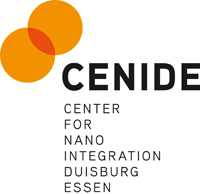Research Project 9
Modeling, simulation, and parametrization of particle formation, particle functionalization, and interaction in synthesis reactors
The project aims to develop a simulation- and modelling-approach for the synthesis of complex nano-materials from the gas-phase, in close collaboration with experiments and diagnostics. The development will require a detailed description of the chemical reactions of the precursor, of the surface-reactions during particle-growth, of particle agglomeration as well as of the effects of diffusive, turbulent and convective transport. The proposed work will rely on the findings from the previous project TP9, which focused on laminar laboratory-scale processes at low pressure, transferring its findings to the overall simulation of a (much larger, turbulent) pilot-scale facility. This scale-up will require to consider detailed particle-turbulence interactions, which are related to the much-investigated turbulence-chemistry interaction. The project will also consider phenomena occurring during the in-reactor processing of the primary particles, such as surface reactions, heterogeneous condensation and agglomeration with secondary particles. To achieve an effective model, micro-mixing must be considered with sufficient accuracy, and the thermo-chemical state of the gas surrounding the particles be described in a realistic manner. Most of the proposed work will rely on Large-Eddy Simulation, which provides (largely) resolved mixing- and temperature-fields which greatly simplifies the modelling of the unclosed terms when compared to the commonly applied time-averaged RANS techniques (Reynolds-Averaged Navier-Stokes). The aerosol-dynamics of the systems investigated does however require the further development and implementation of models for the population-dynamics for multi-variate particle-property-distributions, starting from a method of moments assuming a locally and temporally monodisperse particle-size distribution. The necessity for such a detailed modelling approach became apparent through experiences made in the first phase of the project (microwave-plasma-reactor, TP3 and TP6) and insights into the structure of the particle forming flame (in collaboration with TP7 and its associated Visitor Prof. Rahinov from Tel Aviv), providing good examples for the key challenges of the second project phase: The description of a complex flame-structure by efficient (available) models for turbulence-chemistry interaction and the related development of a suitable (efficient) description of the turbulence-particle interaction.
Project management
Prof. Dr.-Ing. Andreas Kempf
Universität Duisburg-Essen
Fakultät für Ingenieurwissenschaften
Tel.: +49 203 379-8103
E-Mail: andreas.kempf@uni-due.de
http://www.uni-due.de/ivg/fluiddynamik/
Dr.-Ing. Irenäus Wlokas
Universität Duisburg-Essen
Fakultät für Ingenieurwissenschaften
Tel.: +49 203 379-8104
E-Mail: i.wlokas@uni-due.de
https://www.uni-due.de/ivg/fluiddynamik/



